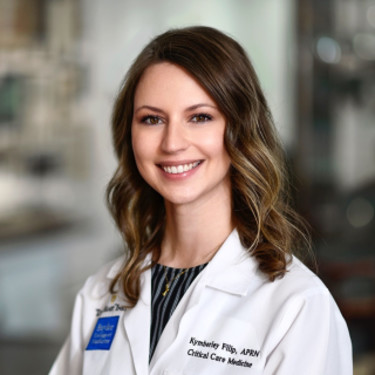We have all heard the old saying “food is medicine,” and that having a healthy diet can help prevent disease or improve symptoms of chronic illness. In the ICU, where I work, adequate nutrition is paramount to encourage wound healing and to prevent frailty — one of the largest predictors of outcomes in critically ill patients. A clinical syndrome that is most prevalent in elderly patients or those who are chronically ill, frailty is characterized by poor muscle mass and generalized weakness, and can be accompanied by malnutrition, which results in a higher risk of mortality. When frail patients become ill, they have little reserve due to low muscle mass to help overcome many disease processes. In severe cases, these patients become too weak to walk or get out of bed and can suffer devastating pressure injuries that hasten their demise. And yet, despite the seriousness of this issue, most medical doctors and APPs don’t receive more than a lecture on clinical nutrition and how to properly instruct patients to eat.
As an ICU nurse practitioner with a degree in nutritional sciences, I believe that as clinicians we are failing our patients when it comes to their inpatient nutritional needs. Oftentimes patients are made NPO for erroneous reasons — such as a biopsy that does not require general anesthesia — or surgeries are delayed for hours or days, resulting in reduced oral intake. Or perhaps we are giving patients incomplete diet orders that are not meeting their nutritional needs, such as clear liquid diets. Many of my patients have complained that when they do receive a diet order, the food tastes terrible and they have no appetite to eat it. Of course, loss of appetite is common when someone is ill, but myself and other clinicians can attest that even if you feel well enough for the hospital tray presented to you, it isn’t always the most appetizing. It is no secret that hospital food is anything but a delicacy — but why are we making it so hard for our patients to eat in the first place? Can you imagine not eating breakfast or lunch for three days in a row because your cardiac catheterization was canceled for the third time? That is six missed meals. Six full servings of desperately needed calories, protein and other nutrients to maintain muscle mass, prevent catabolism, and decrease the progression toward frailty. Six meals that make up roughly 300-600 calories each (1,800-3,600 total calories) that have been lost. It only takes a caloric deficit of roughly 3,500 calories to lose one pound, so in this short time, your patient is already on a path toward breaking down needed body fat and muscle.
Looking at it from a research perspective, the data shows that we don’t really need to make our patients NPO for as long as initially thought. According to a study published in the Journal of Hospital Medicine, clear liquids are emptied from the stomach within two hours of consumption, and a light meal within six hours. There are plenty of other things we could be changing our mindset about as well. Below, I offer a few nutritional pearls to help us reconsider the way we feed patients. These are all based on my eight years of taking care of people with acute and chronic illness.
1) Clear liquid diets have their place, but are often overused with minimal nutritional value. They mostly consist of juice and broth — too much sugar and salt. (Also, the liquids should not be red — if your patient is having a GI bleed, how will you know the difference when they vomit red?)
2) Stop making patients NPO after midnight for procedures in the late afternoon or that do not require general anesthesia.
3) Encourage families to bring familiar foods from home for patients with a poor appetite, if they are able.
4) Stop stopping the tube feeding. For patients that cannot take food by mouth, tube feeds are their only means of nutrition. Since they are liquid formulas, they leave the stomach within just a few hours.
5) Consult the registered dietitian (RD). These specialists have a master’s degree in nutrition and their expertise should be utilized. They will keep calorie counts and assess the exact amounts of macronutrients your patient needs daily. There are many specific disease processes that require specialized diets or diet modifications that RDs can assist with.
6) Advocate for improved quality of hospital food through your hospital’s annual surveys.
7) Engage patients in physical therapy early and often to prevent muscle mass loss. Young patients on bedrest have been shown to lose about 1% of muscle mass per day and older patients on bedrest 5% of muscle mass per day.
Note: There are many caveats to these recommendations depending on the patient’s disease process and each patient should be treated based on their clinical picture. One thing is for certain, however: Eating a nutritious meal is a luxury for many and is often a forgotten part of the treatment plan for patients. Without proper nutrition, our bodies cannot build new tissues and cells to heal or combat disease. Just as we can treat with medications, we are made of the food we consume and without it, we begin to break down. The next time you make your patient NPO or order a less nutritionally dense diet, stop to think about the necessity of this treatment plan and if it is truly of benefit to their care.
How's the quality of the food at your hospital? Share in the comments!
Kymberley Armstrong is an ICU Nurse Practitioner in Houston, TX at Baylor College of Medicine. She has been taking care of critically ill patients for over seven years. Born and raised in Texas, she attended The University of Texas at Austin and is an avid Longhorn fan. Kymberley is a 2023–2024 Doximity Op-Med Fellow.
Illustration by Jennifer Bogartz







